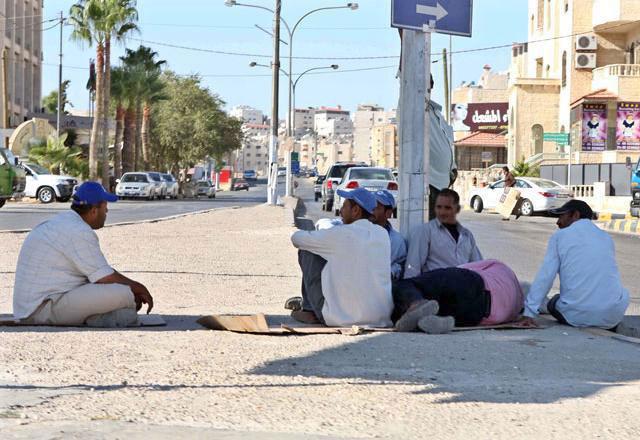You are here
86 out of every 100 women economically inactive — SIGI
By Batool Ghaith - Oct 12,2021 - Last updated at Oct 12,2021

According to SIGI’s report, 83 per cent of unemployed women hold a bachelor's degree or higher (JT file photo)
AMMAN — Jordan is witnessing a slight decrease in the general unemployment rate in the second quarter of 2021 to reach 24.8 percent, according to a Department of Statistics' (DoS) report.
The report showed a decrease in the unemployment rate by 0.2 per cent compared with the first quarter of 2021, as unemployment among males decreased by 1.5 per cent.
However, it significantly increased among females by 4.6 per cent, and the female labour force decreased by 0.1 percent, the DoS said.
According to a report on unemployment by the local women’s organisation, the Solidarity Is Global Institute (SIGI), there are 455,000 economically active women in Jordan as of the second quarter of 2021.
SIGI’s report added that unemployment among females for the second quarter of 2021 has reached 33.1 per cent, and 22.7 per cent among males.
The report also noted that 83 per cent of unemployed women hold a bachelor's degree or higher.
The unemployment percentage of female bachelor's degree holders reached 83.4, while the percentage of unemployed males who hold a bachelor's degree reached 32.1 per cent.
According to SIGI, out of every 100 women in Jordan over the age of 15, a total of 86 women are economically inactive.
“In a period of three months only, the number of unemployed women in the Kingdom increased by 20,000, making the number of unemployed women reach 150,000,” the report said.
“The difficult conditions that have developed due to the pandemic since the beginning of 2020 have had significant negative effects on both male and female workers in general, and day workers in particular," said SIGI’s Executive Director Munir Idaibes.
He added that the pandemic has also "affected many small- and medium-sized enterprises, which has contributed to the loss of many jobs and the disruption of economic activity due to the precautionary measures taken to combat the virus".
Idaibes called on the government to take additional measures to “protect the rights of working women and ensure that they do not lose their jobs, especially those who cannot work remotely, and secure more social protection for them, including protection from domestic violence, exploitation and discrimination".
Economist Wajdi Makhamreh noted that many women had to quit their jobs during the pandemic to stay with their children during lockdowns and to help with distance education.
"There are many factors that led to the rise of unemployment rates for women. Many women across the Kingdom in different governorates could not keep their jobs because of transport issues, cultural reasons and much more,” Makhamreh told The Jordan Times over the phone on Tuesday.
Makhamreh noted that the government should invest and partner with the private sector to create job opportunities for women.
"Encouraging investment in the governorates is very important, and attracting suitable projects for women, such as SMEs or projects and jobs that women can perform remotely to provide opportunities for women who cannot leave their children for example,” Makhamreh added.
Aseel Abu Hammad, a 26-year-old Jordanian, said that she lost her job without warning during the pandemic.
“It was very surprising for me, as I have been working for years and I am the only one working and supporting my family. It was a very difficult situation to go through and I wish they had at least given me notice,” she told The Jordan Times on Tuesday.
Abu Hammad added that she has been unemployed for a year and a half, struggling to find another job.
“I apply to multiple vacancies and go through many interviews, but unfortunately, I started to believe that the vacancies posted are just a formality, and there are actually no vacancies,” she said.
She stressed the importance of a law to protect women’s rights, especially in the workforce.
“I know many women who not only lost their jobs, but also did not receive their payment while they were working, and still have not received it until today,” Abu Hammad added.
Related Articles
AMMAN — Jordan witnessed a 10 per cent drop in births and a 9 per cent increase in deaths during 2020, according to the Department of Statis
AMMAN — The unemployment rate in the first quarter of 2018 stood at 18.4 per cent, up by 0.2 per cent when compared to the first quarter of
AMMAN — Three out of every five working females have bachelor’s degrees or higher, a Sisterhood Is Global Institute (SIGI) statement said We

















